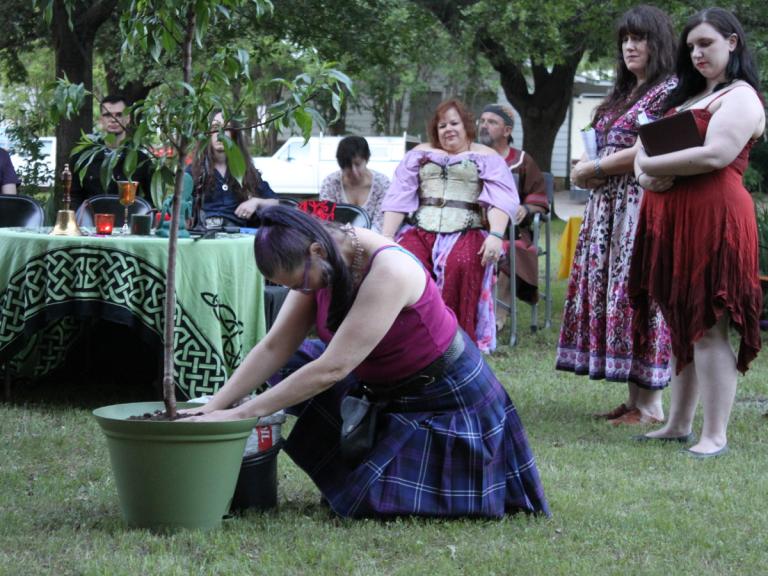
In the comments around the recent unpleasantness, the topic of folkishness has come up yet again. Folkishness is a politically and emotionally charged topic that’s difficult to discuss calmly – some say it’s their sacred tradition, while others say it’s thinly veiled racism.
Loosely speaking, folkishness is the belief that ancestry matters in religion. Thus, people of Germanic descent should worship German Gods, people of British descent should worship British Gods, and people of West African descent should worship West African Gods. For some folkish people, this is an absolute requirement. Others see some leeway, but it’s still a strong recommendation.
Folkishness is a half truth, and like all half truths it is dangerous. Those who latch on to the true parts may not recognize the false until they’re waist-deep in a group whose values don’t align with their own.
Before we discuss folkishness, it will be helpful to examine a now-illegal real estate practice called steering.
Steering
I grew up in Tennessee in the second half of the Civil Rights movement. Laws dictating racial segregation were overturned before I was born, but the impact of those laws did not go away overnight. There were – and to a somewhat lesser extent, still are – white neighborhoods and black neighborhoods.
Some racist white people wanted to keep their neighborhoods all white and would refuse to sell or rent to black people. This practice was outlawed by the Fair Housing Act of 1968, but the law couldn’t make it go away entirely. Real estate agents who wanted to stay on good terms with their white neighbors would simply refuse to show their houses to black buyers and renters.
Some agents who supported integration in theory were concerned about how their black customers would be received. And so they’d say “I think you’d be happier in this neighborhood” – which of course was predominately black.
Some of those steering real estate agents were motivated by prejudice and hatred. Others meant well. But both usurped the sovereignty of the customers. The only people who have the right to decide whether to buy or rent a house in a particular neighborhood are the buyers or renters themselves. Steering is properly illegal and real estate agents who do it can lose their licenses.
Now let’s dig into folkishness and separate the truth from the lies.
Folkishness
As with the steering real estate agents, there are some folkish people who mean well, who only want to help others find the tradition that’s best for them. Others are flat-out racists. Maybe they don’t hate people of different races, but they don’t want them in their religion. And as you might imagine, folkish groups that are all or almost all white are very attractive to those who do hate people of different races.
DNA doesn’t matter. Those who say “the only race is the human race” ignore significant differences in the lives and living conditions of people of different colors and cultures. But biologically they’re correct – race is a social construct. With the exception of a very few small, isolated groups, knowing someone’s ethnic origin tells you nothing about their blood type. Trace your ancestry back far enough and we’re all Africans.
There is simply no physical evidence or logical argument sufficient to draw a connection between DNA and religion. None.
Ancestry matters, some. One of the major elements of modern polytheism – and many other religions – is the worship or veneration of ancestors. It is good and right to honor our ancestors.
The folkish are correct when they say you should honor your grandparents and not someone else’s. But if we are worshiping together and we’re not close family, odds are good we’re all honoring separate grandparents. Go back enough generations, though, and we start to have many-great grandparents in common. Go back 100,000 years or so and we’re all the children of Mitochondrial Eve.
In practice, the folkish demand common ancestry within a certain time range and ignore different ancestry both before and after. At what point do you draw the lines? And who gets to draw them? These lines are completely arbitrary. If it’s OK to honor different ancestors three generations back, why not ten? Or thirty? Or fifty? On the other hand, if we need common ancestry why do our more distant ancestors not qualify?
The religion side is just as arbitrary. For anyone of mostly European descent (and that includes the vast majority of the folkish), our ancestors for the past thousand years or more have been Christians. If you want to follow the religion of your ancestors, why aren’t you going to Mass every Sunday? I’ve come across a few former Protestants who did a bit of genealogical research and decided to become Catholics, because that’s what their ancestors were.
Ancestry does matter some. I’m not a Druid solely because I love Nature. Many of my ancestors came from the British Isles – I want to explore their beliefs and practices, not the beliefs and practices of the Middle Eastern religion that conquered them. That piece of my heritage calls to me, even though it represents less than 1000 of the 70,000 years since my ancestors left Africa. But it is “my” heritage in the sense that I belong to it, not in the sense that it belongs to me.
And if that heritage calls to someone who looks very different from me, who am I to question it?
The land matters, but it’s complicated. It is both possible and desirable for groups of people to have a sacred relationship with the land where they live. On an ordinary level, the land influences culture. On a religious level, the spirits of a place influence your spirit and your spirituality. Texas is now my home, but even after 15 years I do not have the kind of ties to the land as I do back in Tennessee, where my family has lived for around 200 years. I have European friends whose families have lived on the same land for 3000 years – those are deep roots indeed.
But we humans are migrants, and every person in the Western Hemisphere who isn’t a member of a Native American tribe has a brief connection to this land – and an even more tenuous connection to Germany, Norway, England, or where ever their family lived before coming to the New World. For an American folkish group to attempt to exclude or steer someone on basis of a connection to the land borders on the absurd.
Love the land where you are and it will love you back. But never be so arrogant as to think you own the land, or that the land prefers you to a different group of humans.
Culture matters, a lot. For almost 500 years, Protestants have told us that religion is all about what you believe. For most people in most of the world throughout most of history, religion is all about who you are, what you are, and whose you are.
Religion isn’t about affirming a set of supernatural propositions. It’s shared stories and experiences. It’s shared clothes and music and foods – the ones you eat, and the ones you’re forbidden to eat. It’s common values and ways of expressing them. It’s common ways of understanding the Gods and interacting with the Gods.
Where does religion end and culture begin? I don’t know, and I don’t know if that’s a very useful question. Religion and culture are two different circles, but they overlap a lot. And they’re both passed down by instruction and experience, not by blood.
This is why you can’t simply walk up to a Cherokee gathering and say “I’d like to join” the way you can at a Baptist gathering or even a Druid gathering. If you didn’t grow up in Cherokee culture, you can’t understand Cherokee religion. Unless, of course, the tribe adopts you and teaches you their culture, which they’re under no obligation to do.
Every tradition has a culture and newcomers are obligated to respect it. Denton CUUPS has a culture: if you have a problem with gender non-conformity, you won’t fit in. If you insist we only hold circles in your preferred Pagan tradition, you won’t fit in. If you think caring for Nature isn’t important, you won’t fit in. If you insist that your conception of the Gods is the only permissible one (be that polytheist, pantheist, or non-theist), you won’t fit in. However, if you share our UU Pagan culture (or you’re willing to learn it) and you want to worship and work with us, you’re welcome no matter what your other identities are.
Most of the folkish are attempting to re-create a culture that’s been gone for several hundred years. That’s a worthy goal – many polytheists are doing the same thing. But they’re doing so from a foundation of our common American culture.
[Based on Facebook comments from two knowledgeable people, I think the last sentence is unclear. I did not mean that contemporary polytheism is based on American consumerism – that we’re using that as a foundation. I meant that American culture is where Americans are. This is where we begin – you, me, and everybody else. This is what we bring to the table. And most relevantly to this post, this is the culture we all have in common, no matter what our race or ethnicity.]
Those who would exclude or steer away African-Americans, Mexican-Americans, or Chinese-Americans are ignoring the second half of the hyphenation. If you grew up in this country, you’ve observed Tyr’s Day, Woden’s Day, Thor’s Day, and Frigga’s Day. You may have driven a Saturn or a Mercury. If you haven’t danced the Maypole, you’ve certainly seen one. Your government buildings look like Greek temples, and you know Hercules as Steve Reeves, Kevin Sorbo, or a Disney musical.
Congratulation, Americans of European descent – your culture dominates North America. That means it’s the common culture of all North Americans. That means it belongs to African-Americans, Mexican-Americans, and Chinese-Americans just as much as it belongs to you. So when these folks show up at your gathering and you say “wouldn’t you be happier exploring your own culture?” remember – they are.
The Gods Call Who They Call
The Gods are greater than humans – that’s one of the reasons They’re Gods. While some Gods are associated with a particular group of humans, They are not the property of that group. They have agency, and They do what They want for Their own reasons, reasons that are often not clear to us.
I still have no idea why a primal Forest God wanted a nerdy engineer to be His priest, but He did. I have no idea why the Orisha of West Africa occasionally call pasty white folks to become part of Their family, but They do. And I don’t know why the Gods of Northern and Western Europe call people from the other side of the world to serve Them and Their communities, but They do.
It would be the height of impious arrogance for me to ask someone “are you sure you belong here?” just because they don’t look or sound or dress like me. Like steering real estate agents, I would be usurping their sovereignty – their right to make their own religious decisions, for their own reasons.
Folkishness is a Dangerous Half Truth
Many of the folkish argue that they’re not racist, they just want everyone to honor their own Gods and cultures. But a long time ago, we in this country learned that “separate but equal” is mostly about the “separate” and not about the “equal.” The folkish who only want to honor their Gods and ancestors and who do not wish to exclude anyone because of race may need to find another term – perhaps they’re more tribalist than folkish anyway.
Yes, ancestry matters in religion. But it’s more complicated than the folkish make it out to be, and DNA doesn’t matter in the least. Ancestry matters less than culture, and culture matters less than the call of the Gods.
Let us honor and respect the many religions and cultures of the world. Let us be humble and courteous when approaching traditions with which we are not familiar, especially those of people who have been and continue to be oppressed. Let us draw necessary boundaries, to insure the integrity of our traditions.
But let those who stand at the gateways of our religions greet each seeker with a generous welcome and an open hand of friendship. Steering is an usurpation of sovereignty and a violation of hospitality, and it has no place in contemporary Paganism and polytheism.
* * * * * * * * *
For a look at how one Pagan is connecting to her ancestry deeply and authentically without needlessly or maliciously excluding anyone, see Why We All Need Indigenous European Paganism by Melissa Hill, published yesterday on the Agora blog.


















